How to spot fake letters like "Western Union Money Transfer"
Phishing/ScamAlso Known As: Western Union Money Transfer phishing email
Get free scan and check if your device is infected.
Remove it nowTo use full-featured product, you have to purchase a license for Combo Cleaner. Seven days free trial available. Combo Cleaner is owned and operated by RCS LT, the parent company of PCRisk.com.
What is "Western Union Money Transfer"?
Upon scrutinizing the email, it became evident that it was a fake notification from Western Union concerning unclaimed funds. Such fraudulent emails are commonly referred to as phishing attempts. The fraudsters behind this scam intend to deceive recipients into engaging in financial transactions or divulging personal information.
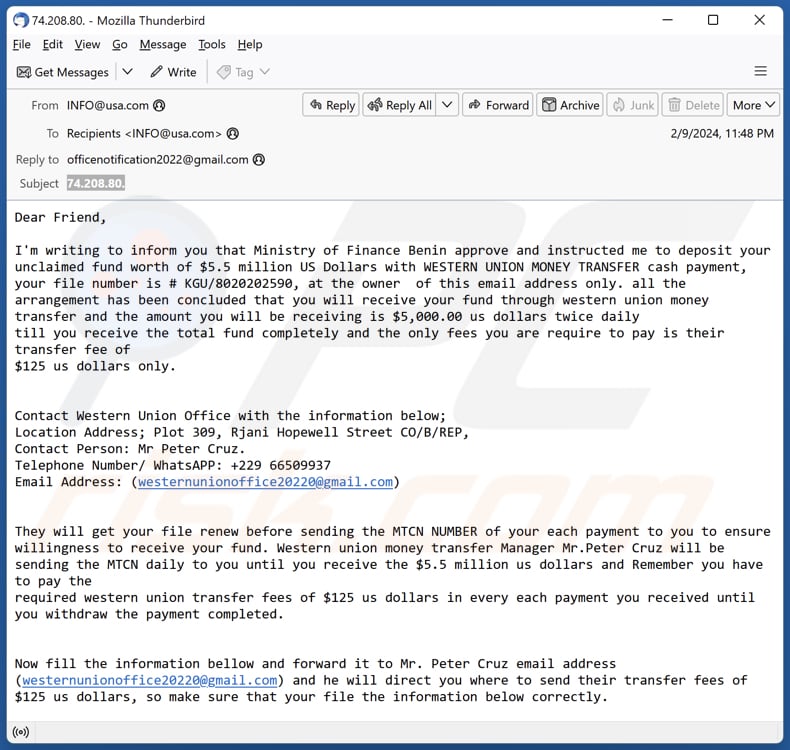
More about the "Western Union Money Transfer" scam email
The fraudulent email is designed to deceive recipients into believing they have an unclaimed fund worth $5.5 million waiting for them, supposedly approved by the Ministry of Finance in Benin. The sender claims to have deposited this amount with Western Union for cash payment. Recipients are instructed to contact a specified individual at Western Union to facilitate the transfer.
The email requests recipients to provide personal information, including their full name, address, country, telephone number, fax number, marital status, age, and occupation, purportedly for file renewal purposes. Additionally, recipients are asked to pay a fee of $125 for each payment received through Western Union, with the promise of receiving $5,000 twice daily until the total amount is received.
The email concludes with a blessing and is signed by someone claiming to be "Mrs. Sandra Leon". However, the entire email is a scam aimed at tricking recipients into disclosing personal information and making monetary transactions. Sending money in response to this email will result in financial loss and potentially expose the recipient to further scams or identity theft.
| Name | Western Union Money Transfer Email Scam |
| Threat Type | Phishing, Scam, Social Engineering, Fraud |
| Fake Claim | Recipients are eligible for unclaimed funds |
| Disguise | Notification from Western Union |
| Symptoms | Unauthorized online purchases, changed online account passwords, identity theft, illegal access of the computer. |
| Distribution methods | Deceptive emails, rogue online pop-up ads, search engine poisoning techniques, misspelled domains. |
| Damage | Loss of sensitive private information, monetary loss, identity theft. |
| Malware Removal (Windows) |
To eliminate possible malware infections, scan your computer with legitimate antivirus software. Our security researchers recommend using Combo Cleaner. Download Combo CleanerTo use full-featured product, you have to purchase a license for Combo Cleaner. 7 days free trial available. Combo Cleaner is owned and operated by RCS LT, the parent company of PCRisk.com. |
Similar scam emails in general
Emails of this kind typically claim to originate from a reputable organization or authority, such as a government agency, financial institution, or well-known company. They entice recipients with promises of substantial sums of money or other benefits.
They typically contain urgent language, instructing recipients to act quickly to claim their supposed rewards or avoid negative consequences. These emails commonly request sensitive personal information or financial transactions, such as bank account details or payment of fees.
They aim to exploit recipients' trust and curiosity to deceive them into divulging information or making payments to fraudsters. Sometimes, such emails can contain links or attachments utilized to deliver malware.
Examples of phishing emails are "Price And Stock Availability", "Protected Message", and "Confirm If The Prices Are Still Valid".
How do spam campaigns infect computers?
Users can inadvertently infect their computers via email by falling victim to deceptive tactics employed by cybercriminals. Malicious actors may send emails containing links or attachments that appear legitimate but actually harbor malware. If users click on these links or open the infected attachments, they can unwittingly initiate the malware's execution on their systems.
It is crucial to understand that not all files distributed via email will infect computers immediately upon opening. Some files may require additional actions from users to activate the embedded malware. For example, malicious MS Office documents cannot inject malware unless users enable macros commands.
Examples of files used to deliver malware are: executable files (.exe), script files (.js or .vbs), document files (.docx or .pdf), compressed files (.zip or .rar), and shortcut files (.lnk).
How to avoid installation of malware?
Avoid opening links or attachments from unfamiliar senders, especially if the email content seems unexpected or out of context. Always verify the authenticity of the sender and the content before taking any action.
Ensure that you exclusively obtain files and applications from reputable sources, like official websites or trusted app stores, while steering clear of clicking on dubious links, pop-ups, or advertisements. Regularly update your software and operating system to guard against known vulnerabilities frequently exploited by malware.
Furthermore, abstain from downloading pirated software or utilizing cracking tools to activate legitimate software. Additionally, employ reliable antivirus or anti-malware software. If you have already opened malicious attachments, we recommend running a scan with Combo Cleaner Antivirus for Windows to automatically eliminate infiltrated malware.
The appearance of the "Western Union Money Transfer" scam email (GIF):
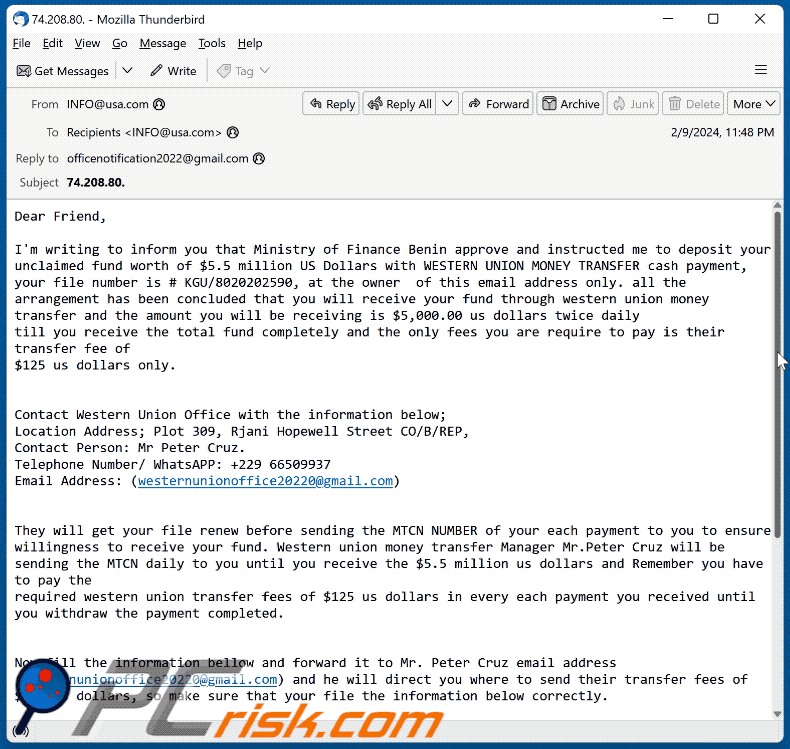
Text presented in the "Western Union Money Transfer" email letter:
Subject: 74.208.80.
Dear Friend,
I'm writing to inform you that Ministry of Finance Benin approve and instructed me to deposit your unclaimed fund worth of $5.5 million US Dollars with WESTERN UNION MONEY TRANSFER cash payment, your file number is # KGU/8020202590, at the owner of this email address only. all the arrangement has been concluded that you will receive your fund through western union money transfer and the amount you will be receiving is $5,000.00 us dollars twice daily
till you receive the total fund completely and the only fees you are require to pay is their transfer fee of
$125 us dollars only.
Contact Western Union Office with the information below;
Location Address; Plot 309, Rjani Hopewell Street CO/B/REP,
Contact Person: Mr Peter Cruz.
Telephone Number/ WhatsAPP: +229 66509937
Email Address: (westernunionoffice20220@gmail.com)
They will get your file renew before sending the MTCN NUMBER of your each payment to you to ensure willingness to receive your fund. Western union money transfer Manager Mr.Peter Cruz will be sending the MTCN daily to you until you receive the $5.5 million us dollars and Remember you have to pay the
required western union transfer fees of $125 us dollars in every each payment you received until you withdraw the payment completed.
Now fill the information bellow and forward it to Mr. Peter Cruz email address (westernunionoffice20220@gmail.com) and he will direct you where to send their transfer fees of $125 us dollars, so make sure that your file the information below correctly.
Fill below info for the renewing of your file.
(1) FULL NAME .................
(2) ADDRESS ....................
(3) COUNTRY ...................
(4) PRIVATE TEL ................
(5) PRIVATE FAX ...............
(6) YOUR FILE NO.... KGU/8020202590
(7) YOUR MARITAL STATUS/AGE..........
(8) YOUR OCCUPATION................
God Bless You,
Mrs Sandra Leon.
Other examples of emails from "Western Union Money Transfer" spam campaign:
Sample 1:
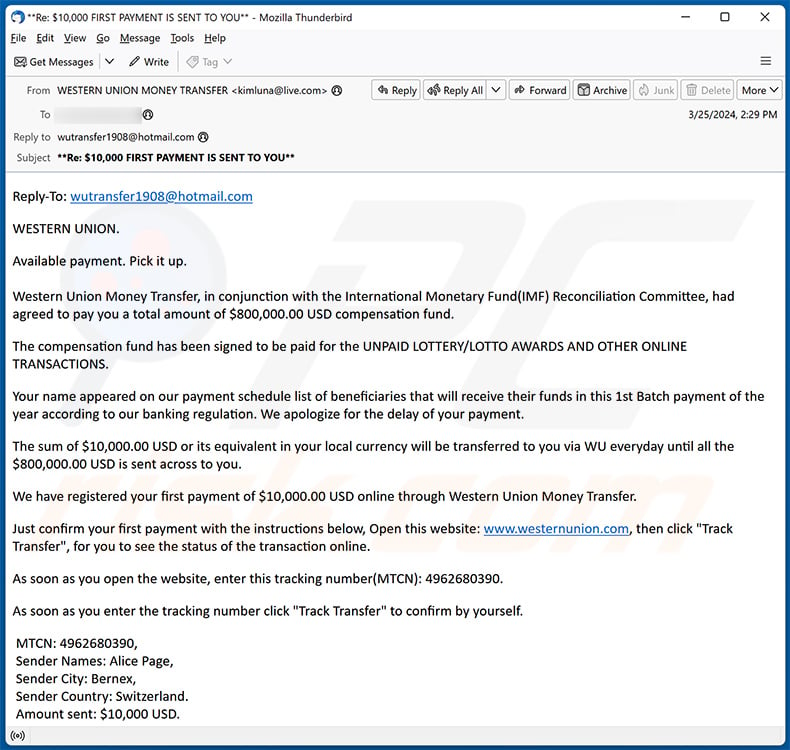
Text presented within:
Subject: **Re: $10,000 FIRST PAYMENT IS SENT TO YOU**
WESTERN UNION.Available payment. Pick it up.
Western Union Money Transfer, in conjunction with the International Monetary Fund(IMF) Reconciliation Committee, had agreed to pay you a total amount of $800,000.00 USD compensation fund.The compensation fund has been signed to be paid for the UNPAID LOTTERY/LOTTO AWARDS AND OTHER ONLINE TRANSACTIONS.
Your name appeared on our payment schedule list of beneficiaries that will receive their funds in this 1st Batch payment of the year according to our banking regulation. We apologize for the delay of your payment.
The sum of $10,000.00 USD or its equivalent in your local currency will be transferred to you via WU everyday until all the $800,000.00 USD is sent across to you.
We have registered your first payment of $10,000.00 USD online through Western Union Money Transfer.
Just confirm your first payment with the instructions below, Open this website: www.westernunion.com, then click "Track Transfer", for you to see the status of the transaction online.
As soon as you open the website, enter this tracking number(MTCN): 4962680390.
As soon as you enter the tracking number click "Track Transfer" to confirm by yourself.
MTCN: 4962680390,
Sender Names: Alice Page,
Sender City: Bernex,
Sender Country: Switzerland.
Amount sent: $10,000 USD.Money Transfer | Global Money Transfer | Western Union
Go to any Western union office in your area and pick it up. Make sure you go with an identification of yourself like a driving license or national id or international passport.
Office Email:[wutransfer1908@hotmail.com]
Yours sincerely,
Dr. Jennifer Willis
Financial Secretary.
Tel: (41) 022 581 22 33
Te: (41) 091 518 16 96
Sample 2:
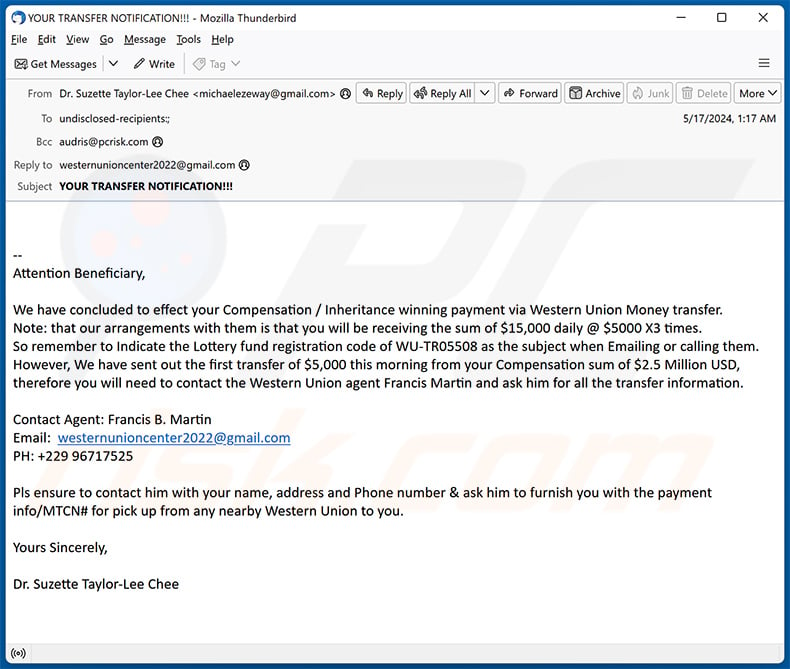
Text presented within:
Subject: YOUR TRANSFER NOTIFICATION!!!
--
Attention Beneficiary,We have concluded to effect your Compensation / Inheritance winning payment via Western Union Money transfer.
Note: that our arrangements with them is that you will be receiving the sum of $15,000 daily @ $5000 X3 times.
So remember to Indicate the Lottery fund registration code of WU-TR05508 as the subject when Emailing or calling them.
However, We have sent out the first transfer of $5,000 this morning from your Compensation sum of $2.5 Million USD, therefore you will need to contact the Western Union agent Francis Martin and ask him for all the transfer information.Contact Agent: Francis B. Martin
Email: westernunioncenter2022@gmail.com
PH: +229 96717525Pls ensure to contact him with your name, address and Phone number & ask him to furnish you with the payment info/MTCN# for pick up from any nearby Western Union to you.
Yours Sincerely,
Dr. Suzette Taylor-Lee Chee
Sample 3:
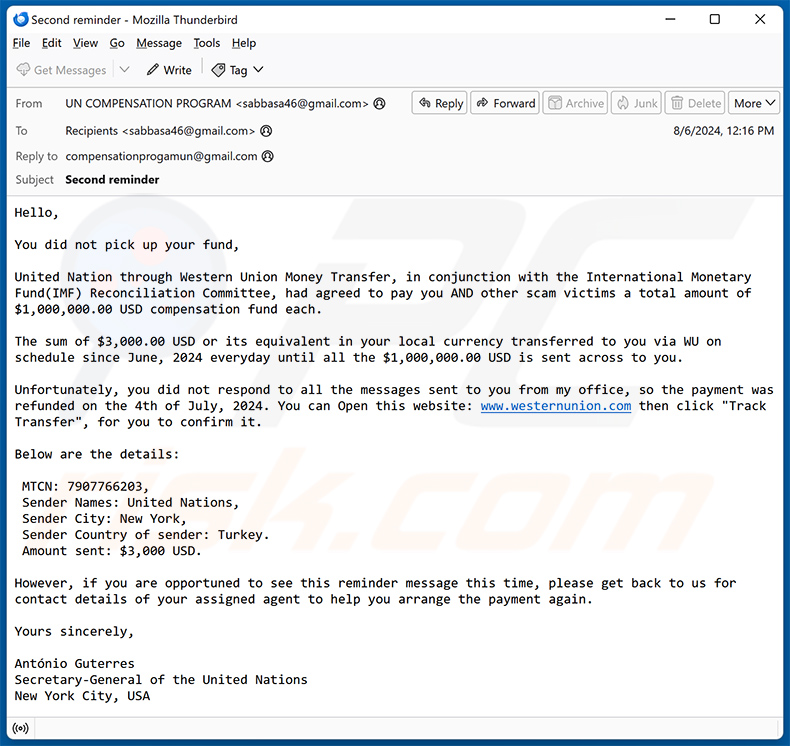
Text presented within:
Subject: Second reminder
Hello,
You did not pick up your fund,
United Nation through Western Union Money Transfer, in conjunction with the International Monetary Fund(IMF) Reconciliation Committee, had agreed to pay you AND other scam victims a total amount of $1,000,000.00 USD compensation fund each.The sum of $3,000.00 USD or its equivalent in your local currency transferred to you via WU on schedule since June, 2024 everyday until all the $1,000,000.00 USD is sent across to you.
Unfortunately, you did not respond to all the messages sent to you from my office, so the payment was refunded on the 4th of July, 2024. You can Open this website: www.westernunion.com then click "Track Transfer", for you to confirm it.
Below are the details:
MTCN: 7907766203,
Sender Names: United Nations,
Sender City: New York,
Sender Country of sender: Turkey.
Amount sent: $3,000 USD.However, if you are opportuned to see this reminder message this time, please get back to us for contact details of your assigned agent to help you arrange the payment again.
Yours sincerely,
António Guterres
Secretary-General of the United Nations
New York City, USA
Sample 4:
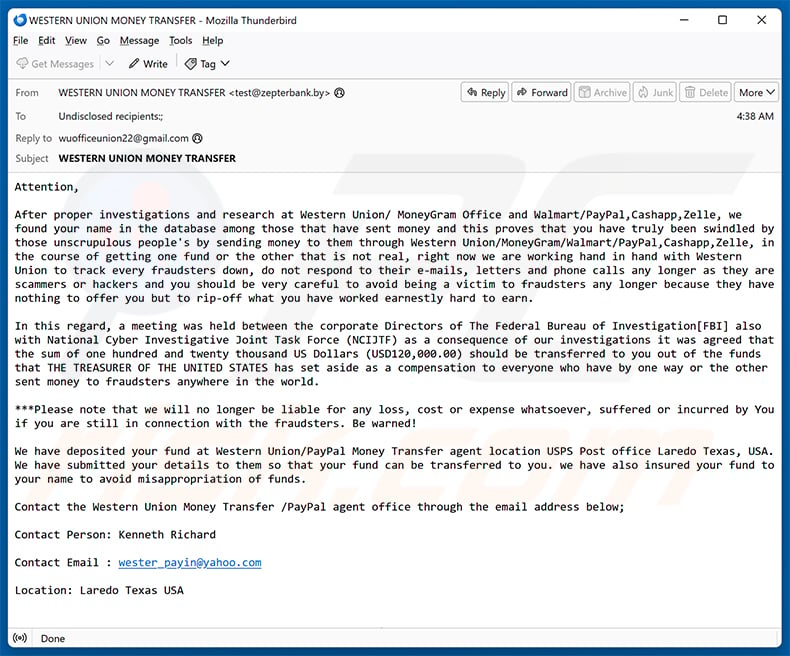
Text presented within:
Subject: WESTERN UNION MONEY TRANSFER
Attention,
After proper investigations and research at Western Union/ MoneyGram Office and Walmart/PayPal,Cashapp,Zelle, we found your name in the database among those that have sent money and this proves that you have truly been swindled by those unscrupulous people's by sending money to them through Western Union/MoneyGram/Walmart/PayPal,Cashapp,Zelle, in the course of getting one fund or the other that is not real, right now we are working hand in hand with Western Union to track every fraudsters down, do not respond to their e-mails, letters and phone calls any longer as they are scammers or hackers and you should be very careful to avoid being a victim to fraudsters any longer because they have nothing to offer you but to rip-off what you have worked earnestly hard to earn.
In this regard, a meeting was held between the corporate Directors of The Federal Bureau of Investigation[FBI] also with National Cyber Investigative Joint Task Force (NCIJTF) as a consequence of our investigations it was agreed that the sum of one hundred and twenty thousand US Dollars (USD120,000.00) should be transferred to you out of the funds that THE TREASURER OF THE UNITED STATES has set aside as a compensation to everyone who have by one way or the other sent money to fraudsters anywhere in the world.
***Please note that we will no longer be liable for any loss, cost or expense whatsoever, suffered or incurred by You if you are still in connection with the fraudsters. Be warned!
We have deposited your fund at Western Union/PayPal Money Transfer agent location USPS Post office Laredo Texas, USA. We have submitted your details to them so that your fund can be transferred to you. we have also insured your fund to your name to avoid misappropriation of funds.
Contact the Western Union Money Transfer /PayPal agent office through the email address below;
Contact Person: Kenneth Richard
Contact Email : wester_payin@yahoo.com
Location: Laredo Texas USA
Instant automatic malware removal:
Manual threat removal might be a lengthy and complicated process that requires advanced IT skills. Combo Cleaner is a professional automatic malware removal tool that is recommended to get rid of malware. Download it by clicking the button below:
DOWNLOAD Combo CleanerBy downloading any software listed on this website you agree to our Privacy Policy and Terms of Use. To use full-featured product, you have to purchase a license for Combo Cleaner. 7 days free trial available. Combo Cleaner is owned and operated by RCS LT, the parent company of PCRisk.com.
Quick menu:
- What is Western Union Money Transfer phishing email?
- Types of malicious emails.
- How to spot a malicious email?
- What to do if you fell for an email scam?
Types of malicious emails:
![]() Phishing Emails
Phishing Emails
Most commonly, cybercriminals use deceptive emails to trick Internet users into giving away their sensitive private information, for example, login information for various online services, email accounts, or online banking information.
Such attacks are called phishing. In a phishing attack, cybercriminals usually send an email message with some popular service logo (for example, Microsoft, DHL, Amazon, Netflix), create urgency (wrong shipping address, expired password, etc.), and place a link which they hope their potential victims will click on.
After clicking the link presented in such email message, victims are redirected to a fake website that looks identical or extremely similar to the original one. Victims are then asked to enter their password, credit card details, or some other information that gets stolen by cybercriminals.
![]() Emails with Malicious Attachments
Emails with Malicious Attachments
Another popular attack vector is email spam with malicious attachments that infect users' computers with malware. Malicious attachments usually carry trojans that are capable of stealing passwords, banking information, and other sensitive information.
In such attacks, cybercriminals' main goal is to trick their potential victims into opening an infected email attachment. To achieve this goal, email messages usually talk about recently received invoices, faxes, or voice messages.
If a potential victim falls for the lure and opens the attachment, their computers get infected, and cybercriminals can collect a lot of sensitive information.
While it's a more complicated method to steal personal information (spam filters and antivirus programs usually detect such attempts), if successful, cybercriminals can get a much wider array of data and can collect information for a long period of time.
![]() Sextortion Emails
Sextortion Emails
This is a type of phishing. In this case, users receive an email claiming that a cybercriminal could access the webcam of the potential victim and has a video recording of one's masturbation.
To get rid of the video, victims are asked to pay a ransom (usually using Bitcoin or another cryptocurrency). Nevertheless, all of these claims are false - users who receive such emails should ignore and delete them.
How to spot a malicious email?
While cyber criminals try to make their lure emails look trustworthy, here are some things that you should look for when trying to spot a phishing email:
- Check the sender's ("from") email address: Hover your mouse over the "from" address and check if it's legitimate. For example, if you received an email from Microsoft, be sure to check if the email address is @microsoft.com and not something suspicious like @m1crosoft.com, @microsfot.com, @account-security-noreply.com, etc.
- Check for generic greetings: If the greeting in the email is "Dear user", "Dear @youremail.com", "Dear valued customer", this should raise suspiciousness. Most commonly, companies call you by your name. Lack of this information could signal a phishing attempt.
- Check the links in the email: Hover your mouse over the link presented in the email, if the link that appears seems suspicious, don't click it. For example, if you received an email from Microsoft and the link in the email shows that it will go to firebasestorage.googleapis.com/v0... you shouldn't trust it. It's best not to click any links in the emails but to visit the company website that sent you the email in the first place.
- Don't blindly trust email attachments: Most commonly, legitimate companies will ask you to log in to their website and to view any documents there; if you received an email with an attachment, it's a good idea to scan it with an antivirus application. Infected email attachments are a common attack vector used by cybercriminals.
To minimise the risk of opening phishing and malicious emails we recommend using Combo Cleaner Antivirus for Windows.
Example of a spam email:

What to do if you fell for an email scam?
- If you clicked on a link in a phishing email and entered your password - be sure to change your password as soon as possible. Usually, cybercriminals collect stolen credentials and then sell them to other groups that use them for malicious purposes. If you change your password in a timely manner, there's a chance that criminals won't have enough time to do any damage.
- If you entered your credit card information - contact your bank as soon as possible and explain the situation. There's a good chance that you will need to cancel your compromised credit card and get a new one.
- If you see any signs of identity theft - you should immediately contact the Federal Trade Commission. This institution will collect information about your situation and create a personal recovery plan.
- If you opened a malicious attachment - your computer is probably infected, you should scan it with a reputable antivirus application. For this purpose, we recommend using Combo Cleaner Antivirus for Windows.
- Help other Internet users - report phishing emails to Anti-Phishing Working Group, FBI’s Internet Crime Complaint Center, National Fraud Information Center and U.S. Department of Justice.
Frequently Asked Questions (FAQ)
Why did I receive this email?
Phishing attacks often involve sending out mass emails to a large number of recipients in the hope that some will fall for the scam. These emails are usually sent indiscriminately to email addresses obtained from public sources, leaked databases, or previous data breaches.
I have provided my personal information when tricked by this email, what should I do?
If you have divulged any banking or credit card information, it is imperative to promptly inform your bank or credit card provider about the incident. If you have shared your ID card information, notify the local government agency responsible for identity theft or fraud. Furthermore, flag the phishing email to your email service provider as spam or phishing.
I have downloaded and opened a malicious file attached to an email, is my computer infected?
The level of risk varies depending on the file type. For instance, running an executable file carries a substantial risk of infection, whereas document files such as .pdf or .doc are less prone to causing harm.
I have sent cryptocurrency to the address presented in such email, can I get my money back?
Cryptocurrency transactions are essentially untraceable, making their reversal almost unfeasible.
I have read the email but did not open the attachment, is my computer infected?
Merely opening an email does not pose an inherent risk. Clicking links or opening attached files is what can lead to computer infections.
Will Combo Cleaner remove malware infections that were present in email attachment?
Combo Cleaner can identify and eradicate the majority of known malware infections. Nonetheless, it is crucial to recognize that advanced malware frequently lurks deep within the system. Thus, a comprehensive system scan is imperative to eliminate hidden threats.
Share:

Tomas Meskauskas
Expert security researcher, professional malware analyst
I am passionate about computer security and technology. I have an experience of over 10 years working in various companies related to computer technical issue solving and Internet security. I have been working as an author and editor for pcrisk.com since 2010. Follow me on Twitter and LinkedIn to stay informed about the latest online security threats.
PCrisk security portal is brought by a company RCS LT.
Joined forces of security researchers help educate computer users about the latest online security threats. More information about the company RCS LT.
Our malware removal guides are free. However, if you want to support us you can send us a donation.
DonatePCrisk security portal is brought by a company RCS LT.
Joined forces of security researchers help educate computer users about the latest online security threats. More information about the company RCS LT.
Our malware removal guides are free. However, if you want to support us you can send us a donation.
Donate
▼ Show Discussion